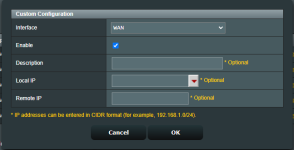In trying to set IP ranges in VPN Director, I found that xx.xx.xx.xx/27 works but xx.xx.xx.xx/26 and anything greater does not. So if I want to do a range of /26 or /25, I need to divide up the ranges into 2 or 4 sub-ranges of /27 (if that's what they are called) in order to get the coverage I want. Is this a bug or a limitation by design?
You are using an out of date browser. It may not display this or other websites correctly.
You should upgrade or use an alternative browser.
You should upgrade or use an alternative browser.
VPN Director IP Range
- Thread starter TonyK132
- Start date
eibgrad
Part of the Furniture
I'm not quite sure what you're asking. But if you're expecting *all* IP ranges to be expressable w/ a single IP network in CIDR notation, that's NOT possible. That's only possible w/ certain IP ranges.
That's why to typically have to change your IP range to accommodate your rule making if you want to limit it to a single rule, rather than the other way around.
That's why to typically have to change your IP range to accommodate your rule making if you want to limit it to a single rule, rather than the other way around.
I'm asking if this is a bug or not. "xx.xx.xx.xx/27 works but xx.xx.xx.xx/26 and anything greater does not."I'm not quite sure what you're asking. But if you're expecting *all* IP ranges to be expressable w/ a single IP network in CIDR notation, that's NOT possible. That's only possible w/ certain IP ranges.
That's why to typically have to change your IP range to accommodate your rule making if you want to limit it to a single rule, rather than the other way around.
octopus
Part of the Furniture
Have you tried:I'm asking if this is a bug or not. "xx.xx.xx.xx/27 works but xx.xx.xx.xx/26 and anything greater does not."
Code:192.168.1.1/25 192.168.1.1 - 192.168.1.127 192.168.1.129/25 192.168.1.129 - 192.168.1.254
eibgrad
Part of the Furniture
NOT all CIDR notation is valid. For example, 192.168.1.1/24 is NOT a valid CIDR range. It has to be 192.168.1.0/24, or else any attempt to create a route w/ the former will be rejected. So you need to be specific as to the CIDR you're attempting to create.
IOW, it seems you're under the impression that part you're masking (xx.xx.xx.xx) doesn't matter when it comes to the /xx. It does!
IOW, it seems you're under the impression that part you're masking (xx.xx.xx.xx) doesn't matter when it comes to the /xx. It does!
I'll try that, thanks for the suggestion. But per this screen capture that shows a suggestion of using /24, I suspected /26, etc, should work but it does not.Have you tried:
I know. See the screen shot for my ranges. I tried /25 and /26 and they did not work, so I'm using multiple /27 ranges to cover the IPs that I want. I also attached the screen shot of the entry screen that shows the /24 example, so presumably that would work, but I have not tried /24.192.168.1.1/24 is NOT a valid CIDR range
Attachments
eibgrad
Part of the Furniture
The rules you've created do NOT represent the IP ranges you think based on the description. For example, 192.168.2.101/27 is NOT .101 thru .132. It's actually .96 thru .127. Same for the other rules.
For the IP range of 192.168.2.101 thru 192.168.2.228, you need rules based on the following CIDR notation.
This is why it's usually better to base your IP range on one that requires the fewest number of rules.
The above gives you 128 hosts, but you have to start w/ 192.168.2.64 and end w/ 192.168.2.191. If you insist on *your* IP range, then as I said, you have to use that long list above instead.
For the IP range of 192.168.2.101 thru 192.168.2.228, you need rules based on the following CIDR notation.
Code:
192.168.2.101/32
192.168.2.102/31
192.168.2.104/29
192.168.2.112/28
192.168.2.128/26
192.168.2.192/27
192.168.2.224/30
192.168.2.228/32This is why it's usually better to base your IP range on one that requires the fewest number of rules.
Code:
192.168.2.64/26 # 192.168.2.64 - 192.168.2.127
192.167.2.128/26 # 192.168.2.128 - 192.168.2.191The above gives you 128 hosts, but you have to start w/ 192.168.2.64 and end w/ 192.168.2.191. If you insist on *your* IP range, then as I said, you have to use that long list above instead.
Last edited:
Online IP CIDR / VLSM Supernet Calculator
Fully featured, professional CIDR calculator for all CIDR / VLSM calculations
Similar threads
- Replies
- 0
- Views
- 219
Similar threads
Similar threads
-
-
-
-
-
RT-AX86U - VPN Director Rules are not saving. Logs flooded with kernel: jffs2: Argh. No free space left for GC
- Started by thunder2k
- Replies: 23
-
-
VPN Client/VPN Director Issue: web pages slow to load, even on devices not routing through VPN
- Started by dom2114
- Replies: 0
-
-
-
Solved How to configure VPN Director with VPN for external IPs and LAN for internal IPs?
- Started by ssh
- Replies: 3
Latest threads
-
CleanBrowsing Family filter bypass on Apple devices with Safari inPrivate browsing
- Started by Blezzz
- Replies: 1
-
-
-
-
ZYXEL XGS1250-12 1/2.5/5/10G SwitchZYXEL XGS1250-12 1/2.5/5/10G
- Started by Notconnected
- Replies: 5
Support SNBForums w/ Amazon
If you'd like to support SNBForums, just use this link and buy anything on Amazon. Thanks!
Sign Up For SNBForums Daily Digest
Get an update of what's new every day delivered to your mailbox. Sign up here!


